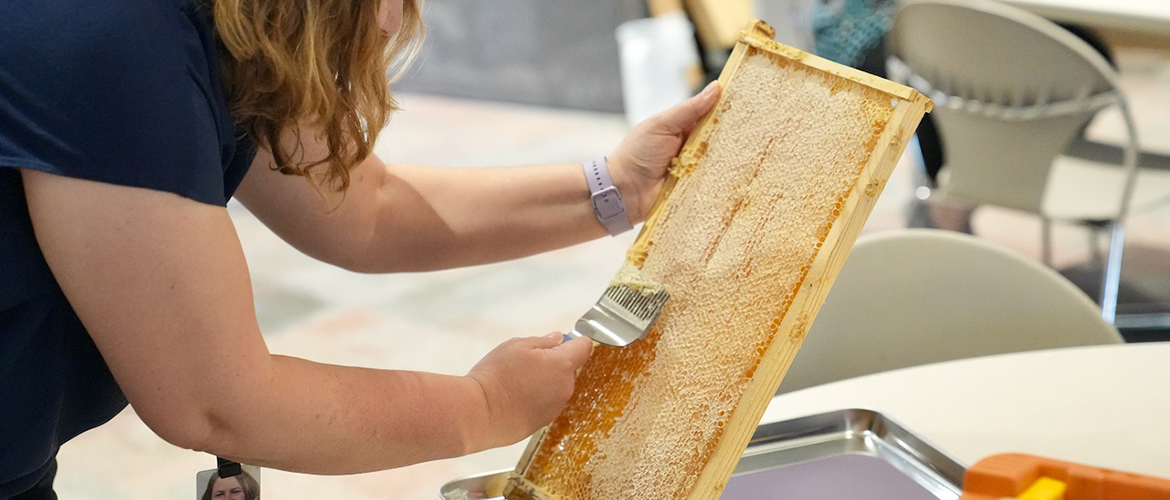Honeybees are not only great at influencing the ecosystem, substantially contributing to pollination, and producing delicious honey — they also do a buzzy job of bringing people together.
In the summer of 2022, Blue Cross and Blue Shield of New Mexico's (BCBSNM) Albuquerque Headquarters installed two hives on the north side of the building with an aim to positively impact pollinator health in the surrounding environment. The hives house nearly 120,000 honeybees.
Bees spend their lives foraging for pollen (a food source for the hive) and nectar (the raw product of honey). Pollen collected on their legs and underbellies spreads around the environment, effectively pollinating plants, flowers and agricultural crops.
The United States Department of Agriculture estimates pollinators, like bees, help pollinate approximately 75% of the world's flowering plants. They pollinate roughly 35% of the world’s food crops — including fruits and vegetables.
“I'm very interested in doing my part to contribute to a more sustainable way of life, and I love how BCBSNM is acting as an example to other corporations of how their practices impact the environment,” says beekeeper Amy Owen. She works for Alvéole, a company that helps businesses, schools and other organizations interested in sustainability efforts bring bees to their buildings.
Harvesting honey and talking about the process, Owen says, has a unique way of interesting people in the practice of sustainability.
In September 2023, a group of about 25 BCBSNM employees took a short break from their desk jobs to join a “Hive to Honey Jar” workshop led by Owen. The hands-on workshop allowed the employees to uncap honeycomb cells and hand-spin hive frames in a honey extractor. Participants even got to taste the honey right from the extractor’s tap.
“I enjoyed learning about the honey-making process and our beehives at Albuquerque Headquarters,” says participant Jackie Deen, who works as a care coordinator. “I had a really great time. All the participants seemed really engaged and interested in learning about how these bees are important to our local environment.”
“Events like these allow me to learn about such a fascinating topic, alongside my colleagues.”
Deen, who works from home most of each week, says she was glad she got the opportunity to meet and mingle with other staff she doesn’t see very often — or has never met.
“Thanks to these bees, I met coworkers I might not have had the opportunity to meet otherwise,” she says. “Events like these allow me to learn about such a fascinating topic, alongside my colleagues.”
Deen and the other two dozen participants learned the BCBSNM honeybees were extremely successful in producing honey this year despite the drought. This is due to the proximity of BCBSNM Albuquerque Headquarters to the Bosque. Owen says the bees gathered pollen and nectar from the tamarisk, salt cedar and Russian olive that grow and flourish near the Rio Grande.
“As the bee flies, it’s less than two miles from here to the river,” Owen says. “So, because we’re so close to a water source, these bees don’t need as much rainfall to produce honey.”
“They were able to produce 40 frames of honey, which amounts to more than 200 jars of honey,” she adds, noting that each hive frame weighs about four to seven pounds.
Each workshop participant received a jar as a thank-you for their help with the harvesting process.
“We beekeepers only take what the bees don’t need to survive the winter,” Owen says. “Thankfully, the hives at BCBSNM have an abundance of honey, which was such a pleasant surprise.”

